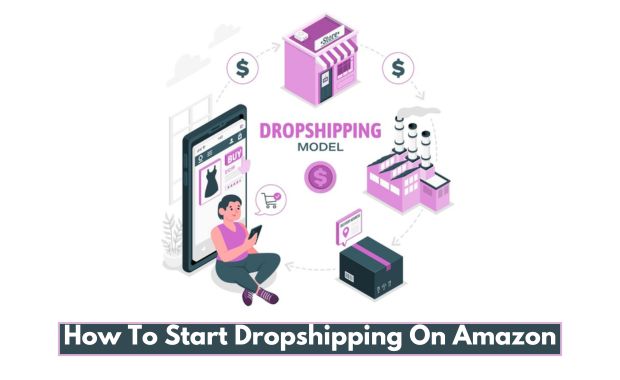Dropshipping on Amazon is a lucrative opportunity for entrepreneurs to sell products without holding inventory. In this guide, we’ll take you through the process step-by-step, covering everything from account setup to choosing the right products and ensuring compliance with Amazon’s policies. By the end, you’ll be equipped to launch your Amazon dropshipping business with confidence.

1. What is Dropshipping on Amazon?
Dropshipping on Amazon involves listing products on the platform, purchasing them from third-party suppliers when customers order, and having the supplier ship directly to the customer. This model eliminates the need for inventory management and upfront stock investments.
For more insights on e-commerce strategies, visit our blogging tips section.
2. Why Choose Amazon for Dropshipping?
| Advantages | Details |
|---|---|
| Vast Customer Base | Access to millions of active shoppers worldwide. |
| Trusted Platform | Builds credibility and trust with potential buyers. |
| Fulfillment Services | Option to leverage Fulfilled by Amazon (FBA) for enhanced logistics. |
| Global Reach | Opportunities to sell in multiple countries. |
| Scalable Business Model | Start small and expand as your business grows. |
3. Amazon’s Dropshipping Policy
Before starting, familiarize yourself with Amazon’s dropshipping policy to avoid violations:
- You Must Be the Seller of Record: Your name or business must appear on all packing slips and invoices.
- No Third-Party Invoices: Suppliers’ information must not be visible to customers.
- Responsibility for Returns: You must handle all customer service and returns.
- Policy Compliance: Adhere strictly to Amazon’s policies to avoid account suspension.
Learn more about maintaining compliance in our detailed guide on Amazon policies.
4. Step-by-Step Guide to Start Dropshipping on Amazon
Step 1: Set Up an Amazon Seller Account
- Choose Your Plan:
- Individual Plan: Suitable for selling less than 40 items per month.
- Professional Plan: Ideal for larger-scale operations with additional features.
| Plan | Cost | Features |
| Individual Plan | $0.99 per item sold | Pay-as-you-go, basic features. |
| Professional Plan | $39.99 per month | Advanced analytics, bulk listing tools, and Buy Box access. |
- Register:
- Provide your business information, tax ID, and bank account details.
- Verify your identity and set up your seller profile.
Step 2: Research Profitable Products
- Use Data-Driven Tools: Tools like Jungle Scout or Helium 10 can help analyze market trends and competition.
- Focus on High-Demand, Low-Competition Products:
- Avoid overly saturated categories.
- Look for products with consistent sales and minimal seasonality.
Discover additional tools and tips in our resources for Amazon sellers.
Step 3: Find Reliable Suppliers
Partner with trustworthy suppliers to ensure product quality and timely delivery. Popular platforms include:
| Supplier | Features |
| AliExpress | Wide variety of products and global shipping. |
| Oberlo | Easy integration with Shopify. |
| Spocket | Focuses on US and EU-based suppliers. |
Step 4: List Your Products on Amazon
- Create Listings:
- Use keyword-rich titles for better visibility.
- Write detailed descriptions highlighting product benefits.
- Include high-quality images.
| Key Listing Element | Best Practices |
| Title | Keep it concise; include primary keywords. |
| Bullet Points | Highlight features and benefits in a scannable format. |
| Images | Use high-resolution images; show the product from multiple angles. |
Step 5: Manage Orders and Customer Service
- Automate Order Fulfillment: Use tools like AutoDS to streamline the process.
- Provide Excellent Customer Service:
- Respond promptly to inquiries.
- Handle complaints professionally.
5. Tools and Resources for Amazon Dropshipping
| Tool | Purpose |
| Jungle Scout | Product research and analytics. |
| Helium 10 | Keyword research and SEO. |
| AutoDS | Automates order fulfillment. |
| FeedbackWhiz | Manages customer reviews and ratings. |
For a complete list of recommended tools, check out our Amazon tools guide.
6. Tips for Success
- Focus on SEO: Optimize your product listings for Amazon’s A9 algorithm.
- Monitor Your Performance: Use Amazon’s Seller Central dashboard to track metrics like sales, reviews, and returns.
- Stay Updated on Policies: Regularly review Amazon’s guidelines to ensure compliance.
- Leverage Marketing:
- Use Amazon PPC campaigns to boost visibility.
- Encourage satisfied customers to leave positive reviews.
Explore our marketing strategies for more insights.
7. Common Pitfalls to Avoid
- Choosing Poor Suppliers: Vet suppliers carefully to avoid quality and shipping issues.
- Violating Amazon’s Policies: Non-compliance can lead to account suspension.
- Neglecting Customer Service: Poor service can result in negative reviews and lost sales.
- Overpricing Products: Research competitors’ pricing to stay competitive.
Dropshipping on Amazon is a scalable and rewarding business model when approached strategically. By following the steps outlined above and focusing on compliance, customer service, and effective marketing, you can establish a profitable presence on one of the world’s largest e-commerce platforms. For more insights and strategies, visit BloggingKK.org.